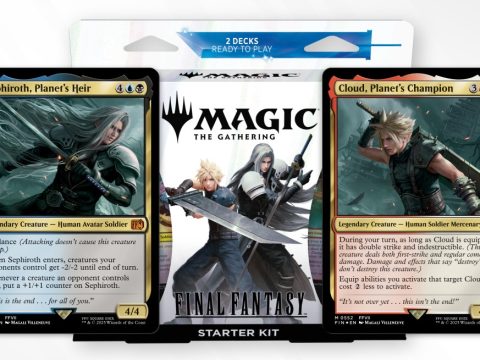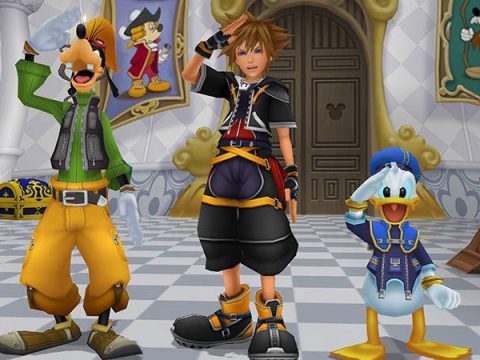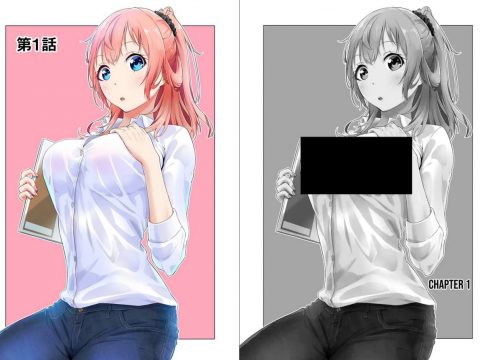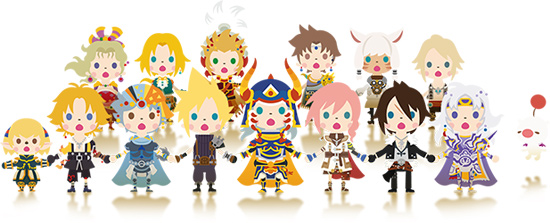
Back in 2012, Square Enix released Theatrhythm Final Fantasy , a 3DS game that attempted the bold jujitsu of merging Final Fantasy with a music game. The results were successful enough to green-light a sequel — Theatrhythm Curtain Call — which dropped just a few weeks ago in Japan (a US release is confirmed with a pending release date), and… guys, it’s good. It’s really, really good.
A disclaimer: I like music games a lot. Maybe too much, maybe I’m biased. That said, while Theatrhythm borrows a few design elements from games like Dance Dance Revolution and Taiko Drum Master, it is very much designed primarily for people who have never played music games before, never had any interest in them, and never would have given this game a second thought if it didn’t have Final Fantasy attached to the title.
What’s so impressive to me about the whole thing is just how well it manages to court both audiences. I haven’t really played a Final Fantasy game since VII, but Curtain Call still managed to dig its fangs deep into the squishy parts of my brain and has yet to let go (spoilers: I might actually be dead right now). It nails the music game part, it nails the RPG part, and somehow the two don’t jar up against each other and explode, but just the opposite — they make each other stronger.
Overture
First, let’s talk about the music game part, which comes in 3 slightly different forms depending on the kind of song you’re playing. For battle themes, the screen is laid out like a random encounter from the earlier FF games, with your party in a row on the right side and the monster they’re battling on the left. Circular note triggers come flying in from the left side of the screen towards your party, and it’s your job to tap the touch screen with the stylus in time to the music when they reach one of 4 circular trigger points situated next to your party members.
Like in DDR and other music games, every note you hit is ranked from “Critical!” (you nailed it) to “Bad” and “Miss,” and there are special notes that require you to flick a direction or hold the stylus down, too. Towards the middle is a “Feature Section” with slightly bolder, brassier looking notes. Perform well here, and your lead party member’s summon monster will show up to do some serious damage; blow it, and a chocobo will show up instead.
Field music works much the same way, but with only one trigger on the right side of the screen instead of 4, and only one party member onscreen. Instead of determining how many monsters you defeat, your performance during these songs decides how fast you run, the quality of the chocobo you find, and whether you run into any gift-bearing moogles on your journey.
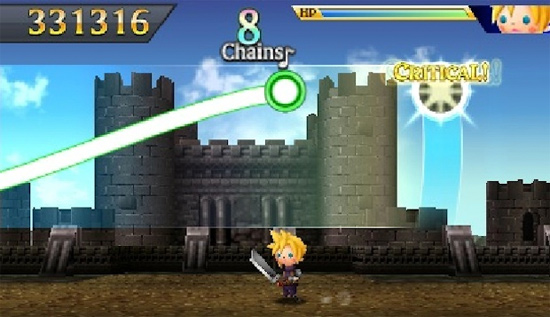
Finally, there are a handful of event songs, which break the mold a little bit. In these, the background is replaced with some kind of full-motion video sequence, like the intro to Final Fantasy Tactics, and instead of the notes flying in from the left side of the screen towards a marker on the right, it’s just the opposite: the notes are fixed in place, and the marker is the thing moving around the screen, following a trail of light in swooping circles and hard angles. Perform well during the Feature Section and you’ll get to play an entire extra section of the video.
But what about the RPG part? After every song, your party gets experience points and items depending on how many monsters they beat up or how far they traveled, and the experience curve is set up so that no matter how you play, there’s a good chance you’re going to level up after every song. Level up, and you get more abilities, higher HP and stats. More stats make things easier for you in all the ways you might expect: higher strength means you’re going to beat more monsters, higher speed means you’re going to travel farther, and higher luck means more and better item drops. Having more HP and defense means you don’t take as much damage when you miss notes, meaning that yes, you can totally finish that super hard boss song. All you have to do is grind a bit.
Abilities work in much the same way. Some are assists like Cure or Shell that heal your HP or reduce damage from enemies, some are buffs that raise your party’s stats, and others just slam jam the enemy for massive damage. It’s all just light enough to not annoy me that there’s all this RPG business going on in my music game, while being just deep enough to require a little thought before going back to the Actual Game. Really well-executed.
Shuffle or Boogie
It really can’t be understated just how crazy the songlist is in this game. There are over 200 songs included by default, spanning every mainline Final Fantasy game, and then it just keeps going until eventually you’re in serious Encyclopedia Brown territory: Tactics, X-2, Crystal Chronicles, Mystic Quest, and more. Whoever was in charge of deciding what songs to include must have had a lot of fun, and it shows.
Now, I never played the original version of Theatrhythm for various reasons — not owning a 3DS at the time, for one — but based on what I’ve gathered from talking about Curtain Call with friends who played the original, this is a hugely improved take on the concept, with just about every common complaint players had about the original addressed or fixed.
Something I heard about vanilla Theatrhythm that made me a little leery about picking it up was that it forced you to slog through a lot of busywork at the beginning to unlock songs, features and other game modes, with the real game not really opening up until after you’d already spent hours getting led by the hand through a guided tour of the game’s songlist.
Curtain Call doesn’t do that. After starting the game up for the first time, it asks you to make a starting party by picking your 4 favorite FF characters out of a huge roster drawn from every game in franchise history. You want Cecil from FFIV on your squad? Squall from FFVIII? Benjamin from Mystic Quest? You get to make that decision right from the get go. Almost immediately after this initial step, nearly every song in the game gets unlocked for you to play at your discretion, all difficulties unlocked, no hoops to jump through. That is what I am talking about.
Another common complaint I heard about the original was that unlocking characters was a random number generated nightmare, with no surefire way to get the crystal shards necessary to unlock all the characters short of grinding out songs for dozens — if not hundreds — of hours. I know friends who have been playing the original since it came out nearly two years ago who still don’t have all the characters unlocked. That’s no good.
Curtain Call, again, doesn’t have any of that. Characters are associated with different color crystal shards, which the game hands out constantly. Collect enough, and you can pick any character you want from their associated color’s character roster to unlock. If you want Galuf from FFV on your team now, you don’t have to wait for the random number generator to decide that for you — find five silver shards, and bam, he’s on your squad (the other silver characters are VII’s Barrett, IX’s Eiko, XI’s Lilisette, and XIII’s Vanille, in case you were wondering).
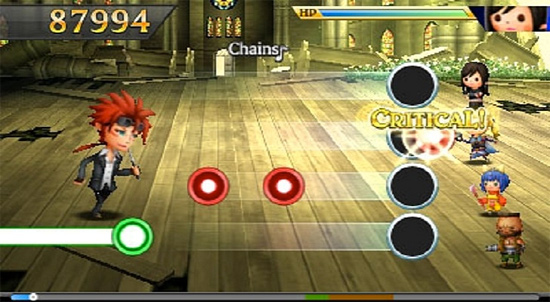
Compression of Time
What else? Vanilla Theatrhythm, in an effort to balance the RPG stat-gain numbers-going-up part with the skill-based music game part, forced players to unequip all of their party members’ abilities in order to get a “Stoic Bonus” for high scores. I can vaguely understand the mindset behind that design decision, but everyone I spoke to hated, hated, hated it. And hey, it’s gone in Curtain Call — whether you have abilities equipped or not has no effect on your score. Instead of feeling like two conflicting halves of the same game, there’s harmony now. A terrifying, compulsive harmony that demands you be leveling up all the dang time.
It really is kind of crazy how powerful adding RPG elements is to a game like this. Music games already have a compulsive “one more game” feel to them. Every song is about 2 minutes long, you have 10 minutes left before the end of your lunch break, might as well just play a few more, right? But when you also have a party that’s leveling up after every song — sometimes 5 or 6 levels at a time holy mother of God — and getting new abilities that are going to get you more items that you’re going to use to beat more monsters, open cooler, rarer treasures chests, run faster, fly farther, touch the untouchable, break the unbreakable, well. It’s a heck of a positive feedback loop. Or an all-consuming Ouroboros, depending.
And they’ve added more features in this version to make sure that loop never ends. In the original game, like most RPGs, when a character hit level 99 that was it, they were maxed out, time to move on to another character. In Curtain Call, though, that’s only the beginning, as you can now reset characters at level 99 back to level 1 in return for more ability points. Maybe Cloud can’t equip both Omnislash, high-level magic and all those stat boosting abilities at the same time right now, but reset back to level 1 a few times and suddenly you’ve got a lot more leg room to work with.
Then there’s the Collectacard Crystarium, which lets you use the trading cards the game hands out occasionally in treasure chests or after versus battles to add permanent stat boosts to characters. There’s a lot to dig into here, with every card having different effects, success and critical rates, and a surprising number of strategic choices built into the decision of what cards to use. Considering Collectacards were just another trinket to collect in the original, this is a huge new feature that’s probably destroying some poor guy’s life as we speak.
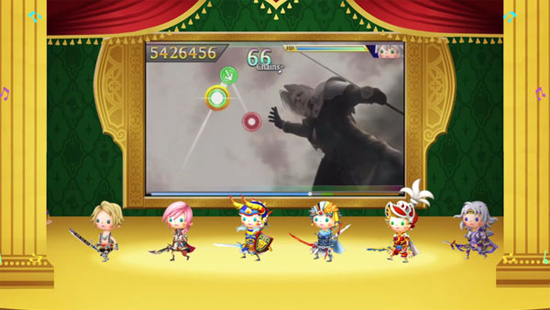
Searching for Friends
There’s almost too much stuff in here to talk about. I haven’t even had a chance to mention the new Quest Medley mode, which randomly generates branching quests out of the game’s songlist, or Versus mode, which is just what it says on the tin and works perfectly.
I’ve played a decent number of games online against other people, and haven’t had any problems with disconnects or any of the usual issues you tend to see in these kinds of games when going online. Part of that is probably because of the way they’ve incentivized sticking around by giving out Collectacards after a match, win or lose.
You also get to exchange profile cards with other players, which lets you see their play stats and share Quest Medleys you’ve completed. Considering the lack of social networking features that comes with being on the 3DS, this is a particularly cool addition, and I’m looking forward to seeing how it evolves once the game drops in the US later this year.
Now for the elephant in the room. A huge chunk of Curtain Call’s songlist is made up of songs that were originally released as paid DLC for the original 3DS release and a free-to-play iOS version that came out a year ago. People have done the math, and if you wanted to buy all the DLC for both older versions of the game, you would need to pay close to $200.
For them to release a new version of the game with all of that DLC included (and more) for less than the price of the original strikes me as being a little unethical. Ichiro Hazama, the game’s producer, has given the PR line in interviews that a lot of the DLC has been changed or tuned from when they were originally released, but it makes me a little wary nonetheless, particularly when they announced the first round of DLC for Curtain Call a week before the game even came out.
I recognize that this is the business model now, and considering how good the rest of the game is I’m hesitant to complain too much. But you better believe I’m not buying any DLC until their promises of this being “the last game in the series” actually ring true.
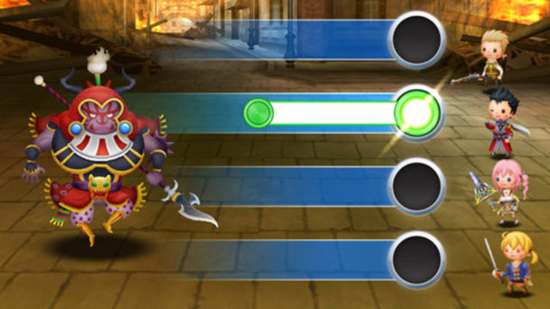
“Good Night, Until Tomorrow”
DLC qualms aside, Curtain Call manages to achieve something I didn’t think was possible in 2014: it makes me want to check out Final Fantasy again, at least a little bit. It makes the best games in the series seem better, and the bad ones more forgivable. It reminds me that for all its missteps over the years, this is a franchise that’s been willing to try crazy stuff just to see what would work, overstepped its bounds, made mistakes.
Final Fantasy Theatrhythm Curtain Call combines an RPG with a rhythm game, refines the concept even further and succeeds better than I could have possibly imagined. If you’ve ever liked Final Fantasy even a little bit — and maybe even if you don’t — you’re going to want to check this out when it comes out in the US in a few months. I’ll see you online.
Final Fantasy Theatrhythm Curtain Call
Publisher: Square Enix
Developer: indieszero
Console: 3DS
Price: 5,800yen (packaged version) / 4,444yen (download version)


